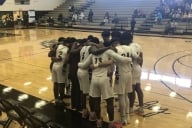You have /5 articles left.
Sign up for a free account or log in.
The National Collegiate Athletic Association unexpectedly backtracked on some of the extensive sanctions it levied against Pennsylvania State University in the wake of Jerry Sandusky’s conviction of 45 counts of child abuse, but it’s neither an acknowledgement that the penalties were rushed or inappropriate, nor a precedent-setting decision, NCAA President Mark Emmert said.
George Mitchell, the former U.S. senator who is now Penn State’s independent athletics integrity monitor (a position created after the scandal to improve campus sports culture), said that after his first annual review of Penn State’s progress he determined the NCAA should “recognize and reward” the administration’s “good-faith effort” to change.
At Mitchell’s suggestion, the NCAA Executive Committee and the Big Ten Conference agreed to restore the scholarships that were revoked in response to last year’s Freeh Report. The findings of former FBI director Louis J. Freeh detailed the cultural and administrative failings that helped enable Sandusky to use his status as a former coach to rape children for years, sometimes on university property.
Initially, the NCAA said Penn State could award just 65 total football scholarships per year through 2017-18, significantly fewer than the 85 that programs at its level are used to handing out. But now, Penn State will receive an additional five scholarships each year through 2016-17. So essentially, the NCAA returned 20 scholarships it had taken away.
“This action provides an opportunity to recognize Penn State’s significant momentum, while also providing additional opportunities for student-athletes,” said Nathan Hatch, chair of the Division I Board of Directors and president of Wake Forest University.
Mitchell also urged the NCAA to “hold out the prospect of further mitigation” – specifically, of its ban on post-season play for Penn State football through the 2016-17 season. “This, I believe, is appropriate, and will create an incentive to stay the course,” he said in a call with reporters Tuesday.
Experts said the decision signals a willingness to be flexible and listen to outside advice, and some sportswriters and critics actually applauded the NCAA for the decision – an incredibly rare thing to happen these days. (Others pointed out that the NCAA was over-reaching in the first place and suggested it was a response to widespread criticism.)
Before Tuesday, it was not apparent that the NCAA would even consider reversing any of Penn State’s punishments, which it announced forcefully and very publicly last July, after deciding to circumvent the traditional enforcement process and rely on the Freeh report.
But LouAnna Simon, chair of the Executive Committee and president of Michigan State University, said Tuesday that the Athletics Integrity Agreement between the university, the NCAA and the Big Ten Conference – which bound Penn State to making numerous changes and improvements – contained a provision allowing for the “possibility of reviewing sanctions” after two years.
“Given Sen. Mitchell’s report,” Simon said, “it seemed appropriate to do something now.”
Penn State has either completed or been excused from completing all of the recommendations in the Freeh report -- designed to improve athletics oversight and by extension the campus culture -- other than those requiring multiyear efforts, Mitchell writes in his review.
Emmert said that Penn State did not request the restoration of scholarships or anything else. A university statement released Tuesday said that Penn State officials were "gratified by the decision."
Emmert also suggested that other programs currently under NCAA sanctions – or those who are in the future – shouldn’t read too much into what this unprecedented move means.
“It’s important to remember that this case has been handled in an extraordinary manner, and because of the extraordinary circumstances of the situation,” Emmert said. “It should not be seen as a precedent of handling other cases, but in fact an example of the circumstances of this unique case.”
But while Emmert may not have set a legal precedent, there is something to be said for the fact that there’s now…. well, precedent. Now that the NCAA’s backtracked on penalties once, it’s much more likely than it could happen again, said Michael McCann, director of the Sports Law and Entertainment Institute at the University of New Hampshire.
"There's probably a PR aspect to this," McCann said. “The NCAA would at least send a message that there is flexibility, that it’s adaptive, and perhaps that’s how the NCAA will act – more adaptively – going forward than it has in the past.”
Josephine R. Potuto, a law professor at the University of Nebraska at Lincoln and former chair of the NCAA’s Division I Committee on Infractions, had “reservations” about the association going outside its normal process to address an issue that didn’t violate a specific bylaw – even in a case as egregious as Penn State’s.
“In some circles, it’s going to be perceived as backing down. So for them to do it to their own penalties, I think is a laudable thing,” Potuto said, noting that the scholarship reductions harmed people who had nothing to do with Sandusky or even Penn State. “Whatever else is right or wrong about this, nobody ever claimed the players had anything to do with the environment.”
The civic lawsuits pending against the NCAA and Penn State are unlikely to be affected by Tuesday’s announcement, McCann said, although Potuto suggested that “the plaintiffs in the various lawsuits will probably point to this as evidence to support their claims that the decision was ill-advised,” outside the NCAA’s jurisdiction and/or draconian.
“It seems to me this will be an easy place for them to say, ‘Aha!’”, Potuto said. “Whether in fact that will help the lawsuits, I have no idea.”








